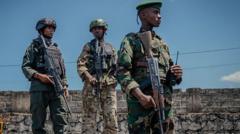Former President of the Democratic Republic of Congo, Joseph Kabila, made a surprising return to the country amid serious accusations of treason related to his alleged support for the M23 militia, a group currently controlling significant parts of the region.
**Political Drama Unfolds as Former Congo President Returns Amid Treason Accusations**

**Political Drama Unfolds as Former Congo President Returns Amid Treason Accusations**
Joseph Kabila's unexpected return to the Democratic Republic of Congo raises questions about his involvement with Rwanda-backed militias.
Joseph Kabila, who led the DRC for 18 years, has recently returned home after years in self-imposed exile following allegations levied by the Congolese Senate accusing him of assisting the Rwanda-backed M23 militia. Despite the Senate's vote for his prosecution in Kinshasa, Kabila's strategic re-entry into the country took place in Goma, a city that is now under M23's control, effectively keeping him out of the government’s reach. His arrival comes at a crucial time when the U.S. attempts to mediate a peace agreement between Rwanda and Congo, as well as engage in mineral deals with both nations. Kabila's presence in the region could complicate these diplomatic efforts.
In a video statement, Kabila criticized current President Felix Tshisekedi's leadership, calling him a dictator. Kabila's return comes after a turbulent political climate characterized by election controversies, where Kabila’s chosen successor faced defeat amidst accusations of electoral fraud, resulting in Tshisekedi's power-sharing agreement that has since unraveled.
Supporters have warmly welcomed Kabila, particularly the political leader of the M23, Corneille Nangaa, highlighting his continued influence over certain factions of the Congolese populace. The implications of his return on the fragile political landscape of Congo, particularly with ongoing tensions involving Rwanda, are yet to be determined as Kabila re-establishes himself in a drastically changed political atmosphere.




















